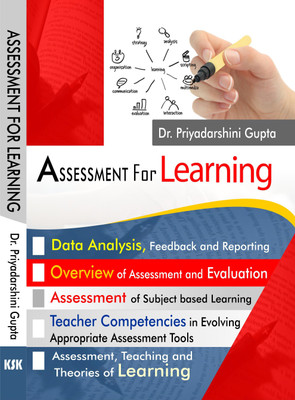Assessment For Learning(English, Hardcover, Dr. Priyadarshini Gupta)
Quick Overview
Product Price Comparison
In classrooms where assessment for learning is practiced, students are encouraged to be more active in their learning and associated assessment. The ultimate purpose of assessment for learning is to create self-regulated learners who can leave school able and confident to continue learning throughout their lives. Teachers need to know at the outset of a unit of study where their students are in terms of their learning and then continually check on how they are progressing through strengthening the feedback they get from their learners. Students are guided on what they are expected to learn and what quality work looks like. The teacher will work with the student to understand and identify any gaps or misconceptions (initial/diagnostic assessment). As the unit progresses, the teacher and student work together to assess the studentŌĆÖs knowledge, what she or he needs to learn to improve and extend this knowledge, and how the student can best get to that point (formative assessment). Assessment for learning occurs at all stages of the learning process.Researchers whose work has informed much of this assessment reform include Ken OŌĆÖConnor, Grant Wiggins , Jay McTighe, Richard Stiggins, Paul Black, Dylan Wiliam, Chris Harrison, Bethan Marshall, Gordon Stobart, Caroline Gipps, Joanna Goodman, Thomas Guskey, Damian Cooper , Philippe Perrenoud, Royce Sadler, BronwenCowie, Margaret Heritage and Ron├Īn Howe.In past decades, teachers would design a unit of study that would typically include objectives, teaching strategies, and resources. The studentŌĆÖs mark on this test or exam was taken as the indicator of his or her understanding of the topic. In 1998, Black &Wiliam produced a review that highlighted that students who learn in a formative way achieve significantly better than matched control groups receiving normal teaching. Their seminal work developed into several important research projects on Assessment for Learning by the KingŌĆÖs College team including Kings-Medway-Oxfordshire Formative Assessment Project (KMOFAP), Assessment is For learning (Scotland), Jersey-Actioning-Formative Assessment (Channel Islands), and smaller projects in England, Wales, Peru, and the USA.Contents of Book: Preface 1. Overview of Assessment and Evaluation 2. Assessment of Subject based Learning 3. Teacher Competencies in Evolving Appropriate Assessment Tools 4. Data Analysis, Feedback and Reporting 5. Assessment, Teaching and Theories of Learning Bibliography


